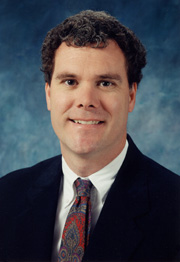 The pager sounds and Tim McCashland, M.D., agrees to squeeze another patient into an already full day. Saying “no” isn’t easy, even when it means late hours, postponing other tasks or interrupting his vacation.
The pager sounds and Tim McCashland, M.D., agrees to squeeze another patient into an already full day. Saying “no” isn’t easy, even when it means late hours, postponing other tasks or interrupting his vacation.
“For what I do, the line is long,” said Dr. McCashland, associate professor of internal medicine and adult hepatologist. “It will always be longer than our ability to provide care.”
Even so, Dr. McCashland sacrifices his own time to assist patients with liver disease and digestive system disorders, while also juggling research responsibilities, communication with referring physicians and teaching of residents and fellows. “I enjoy the relationships with patients and the hope that they get better,” Dr. McCashland said. “That’s always been the fun part of medicine.”
For his commitment and dedication, Dr. McCashland has received this month’s Chancellor’s Gold ‘U’ Award.
|
|
“I cannot say enough about Dr. McCashland’s medical abilities as a physician and his sincere and concerned interest in people as individuals,” said one Gold ‘U’ nominator. “Dr. McCashland carries a hectic schedule between seeing patients in clinic, rounding in the hospital, performing procedures in the GI lab and conducting research. Yet when it comes to his patients, one would never know how many things he is juggling. He takes time to listen to their medical and personal stories with empathy and concern. He always focuses on the patient and their specific needs and the needs of their families. He makes them feel important and an integral part in their own health care.”
Said another nominator: “Patients often comment on how kind and helpful Dr. McCashland is to them. He helps educate them on their illnesses and provides them with hope.”
The journey to med school
The Lincoln native had planned to become a dentist until, in his third year of college, a family friend encouraged him to explore medicine. After several shadowing experiences, Dr. McCashland changed career paths. He graduated from the UNMC College of Medicine in 1987, did his residency and fellowship at UNMC and joined the faculty in 1993.
He pursued hepatology — diseases of the liver — after seeing the “dramatic change” in patients following transplant. “There’s a rebirth of their lives, which is fun to see,” he said.
Busy week
Four days a week, Dr. McCashland sees patients, ranging in age from 20 to 80, to assess if they need a liver transplant. After the evaluation, he manages their liver disease until the transplant, then does rounds with the surgeons and maintains contact after they return home to their primary physician. It’s not unusual, he said, to see 12-16 patients per half-day and do 15-20 endoscopes per day.
Still, Dr. McCashland says his busy schedule simply mirrors his colleagues. “Everyone on our transplant team works extremely hard to provide good patient care,” he said, from the nurses to the secretaries to the data entry clerks. “It’s not just a few people putting in more hours – it’s every member of the team putting in extra hours, which attests to the dedication and love of the relationships they develop with patients and their families. The most amazing part of working here is the very dedicated people.”
A juggling act
The greatest challenge, he said, is finding time to do all the things he wants to do. He is currently reading a book on energy management, in hopes of learning how to better juggle such varied responsibilities – family life, work, research, and the physical and spiritual part of his life.
“We often think about the things that we didn’t get done and need to rather than what makes us most happy,” he said. “The most difficult thing to do is manage what makes you happy and what doesn’t compromise on patient care.”
Outside the office, Dr. McCashland devotes his time to his wife, Beth Asbjornson, and their daughter, Alexandra, who turns 5 on Sunday (April 27). He would like to resume jogging, as well as find more time to read and play golf.